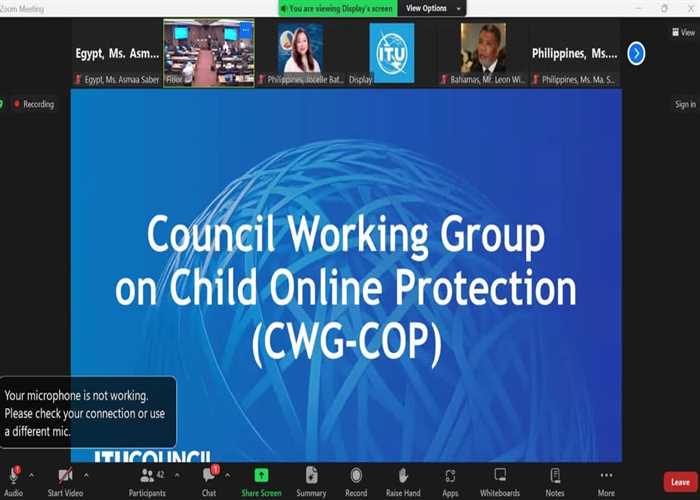
Participation in the 21st meeting of the ITU Child Online Protection Council Working Group
Project : Digital Citizenship and Online Protection Initiative
About efforts of MCIT to Enhance Child Online Protection; Eng. Hoda Dahroug, Advisor to the Minister for Digital Community Development and Director of the Digital Transformation for Sustainable Development Project in Egypt, participated in the twenty-first meeting of the ITU Council Working Group on Child Online Protection.
The Minister's Advisor presented a review of MCIT Digital Egypt strategy, which is in line with the Sustainable Development Goals (SDGs) and Egypt's 2030 Plan, stressing the three pillars of this strategy, namely
increasing investment in ICT infrastructure, supporting digital transformation and innovation, and enhancing digital skills through care and capacity building.
She pointed to the most prominent initiatives sponsored by MCIT to enhance digital skills and innovation in Egypt: the "Digital Egypt Generations Initiative", which consists of four main programs aimed at developing the digital competencies of Egyptian youth in different age groups, which is a comprehensive national effort that reflects MCIT strategy to bridge the gap between education and employment, promote a new generation of innovators, entrepreneurs and digital transformation leaders, and positioning Egypt as a regional center for technology and innovation.
In the same context, she stressed that digital access for all segments of society is accompanied by the lack of many users especially children to the experience and awareness of Internet privacy and cybersecurity threats, and responsible use of social media, which is the biggest motivation behind the launch of the "Digital Citizenship and Online Protection" initiative to be one of the main pillars of MCIT social responsibility, and the strategic approach to ensure a safer Internet for all citizens, through the initiative's main goal to ensure that children are aware of their rights, responsibilities and opportunities to live, learn and work in an interconnected digital world.
The Minister's Advisor reviewed the four trends on which the initiative is based:
- Increasing access to specialized knowledge, content, skills and successful models.
- Capacity building through specialized training and online counseling support services.
- Awareness of digital risks and increased knowledge of cybersecurity technologies and available channels for protection and support.
- Strengthening local and international partnerships to exchange experiences and build successful experiences.
In this context, the most important outputs of the initiative, which are represented in the :
"Wa3i" Gate, which reflects the great importance of spreading awareness of online safety skills and digital citizenship through a community knowledge platform in Arabic Language designed to provide users with the skills they need to navigate the digital world safely and responsibly, including interactive educational content for children, provided remote training services to ensure wider access to all target groups who need to learn how to navigate the digital world with confidence.
The Minister's advisor moved on to the second output of the initiative, which is capacity training programs for trainers, teachers, children and adolescents, which are implemented through MCIT Digital Sustainability Centers in different governorates, in addition to un-NGOs, youth centers, public libraries and schools.
It was also noted that developing these outputs had been done in collaboration with prominent partners: UNICEF Egypt and the National Council for Childhood and Motherhood, where it has been represented:
• Online child protection guidelines for teachers.
• Online Child Protection Guidelines for Parents and Caregivers.
• Interactive and engaging activities on online safety for children.
At the end of her speech, the Minister's Advisor confirmed that the initiative has reached more than 3,000 beneficiaries who affirm through their interactions on social media the building of a positive digital identity, and reviewed a number of the most prominent models of positive practices and successful stories that emphasize the effectiveness of the initiative in implementing its goals and developing the capabilities of trainers, teachers and children to deal with the digital space more safely, reflecting our commitment to empowering young people with the knowledge they need to navigate the digital space with confidence and ethics.
12Feb 2025

 العربية
العربية